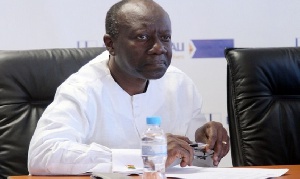Business News of Wednesday, 15 February 2017
Source: B&FT Online
Government must stop starving statutory funds - IFS
If government would not ensure adequate and timely transfers to its statutory funds, then it must as well collapse them, the Institute for Fiscal Studies (IFS), has said, calling for a review of the whole practice of earmarking portions of government revenue to meet statutory obligations.
The District Assemblies Common Fund, established under article 252 of the 1992 constitution, has particularly been at the beck and call of political expediency, as transfers to the fund, and onward transfers to the assemblies, are always in arrears.
In view of the delays, the newly passed Local Governance Act, 2016, has given powers to the fund administrator to invest in securities temporarily, pending the full release of funds to the districts.
“With the exception of the Ghana Petroleum Funds (GPFs), transfers to the earmarked funds have been largely non-automatic as large amounts of monies due to the funds are withheld by the government for other purposes for long periods of time, thereby making the government usually owe the earmarked funds large arrears,” the policy think tank said.
Speaking at a pre-budget forum, on Monday, Leslie Dwight Mensah, an economist with IFS, said, on the average, more than 30 percent of government’s revenue and grants go into these statutory funds, a reason the inefficiencies associated with them need be checked.
“Value for money is not being derived from the earmarked expenditure. At the same time, earmarking has made the budget inflexible to manage,” he said.
Reviewing these funds must lead to a collapse of those found to have been ill-performing, with the attendant spending realigned to the main budget, he said.
There are currently eight earmarked funds, comprising the District Assemblies Common Fund (DACF), the Ghana Education Trust Fund (GETFund), the National Health Insurance Fund (NHIF)
Petroleum-Related Funds, Ghana Infrastructure Investment Fund (GIIF), Ghana National Petroleum Corporation (GNPC, the Social Security and National Insurance Trust, and the Road Fund.
According to the Institute, after carefully examining seven of the earmarked funds, it found that most of the funds, apart from being dogged by delays in transfers, were inefficiently managed, and they performed poorly and have mostly failed to pass their usefulness criteria.
Due to the entrenched nature of the problems associated with the funds and the fact that there are no signs that something concrete is being done to resolve them, the IFS said the government should put an end to the establishment of new earmarked funds unless they have been found to be absolutely essential.
While advocating an embargo on creation of new earmarked funds, the existing earmarked funds must be reviewed so that those that are found to be doing badly can be incorporated into the main budget.
The Institute advised that to ensure that the Funds meet their overall objectives, government must ensure automatic transfers into them and also resolve challenges that hinder their effective performance.
“Ways have to be found to reduce costs and do away with corruption and management malpractices. Unnecessary interference in the operations of the earmarked funds for political gains must be avoided,” the Institute said.











